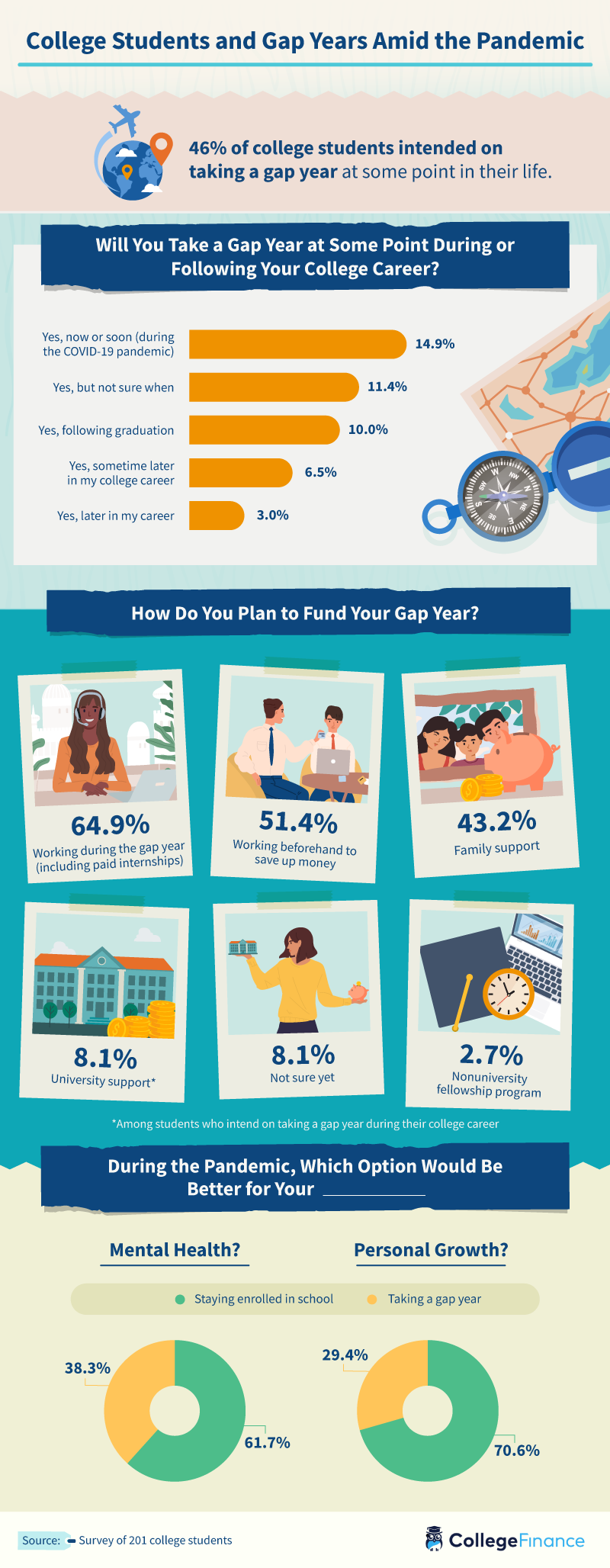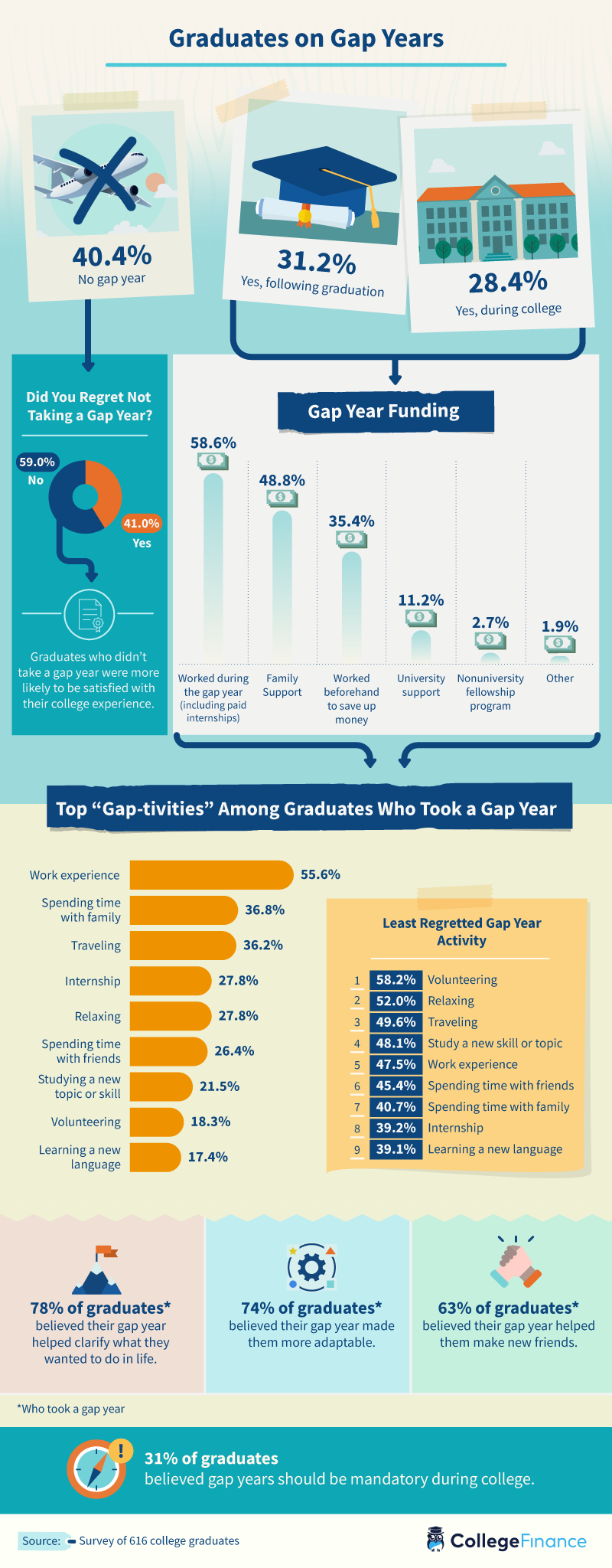Study Highlights According to Survey Respondents
- 46% of college students intended on taking a gap year at some point in their life.
- Nearly 15% of college students planned on taking a gap year during the COVID-19 pandemic.
- 78% of college graduates participating in a gap year believed the time helped clarify what they wanted to do in life.
- 31% of college graduates believed gap years should be mandatory during college.
- 67% of hiring managers believed it beneficial for students and recent graduates to take a gap year amid the pandemic.
- 21% of hiring managers were more likely to hire a candidate who had taken a gap year.
The COVID-19 pandemic has imposed so much uncertainty about whether colleges in the U.S. will resume on-campus classes for the 2020 academic year. While some colleges will adopt a hybrid model, others are opting for longer days and shortened semesters. Many students, and their families, are reluctant to pay for student loans for a virtual experience. For many current and future college students, the in-person experience of traditional classes, peer interaction, and on-campus activities are essential to the collegiate experience. This has led to a huge uptick of young people deferring college to take a gap year.
Recently, the Gap Year Association witnessed a spike in website traffic, indicating an increased interest in gap years. With this influx of curiosity, it only made sense that we’d explore perceptions surrounding gap years. We launched a survey to over 1,000 college students, graduates, and hiring managers to measure interest and opinions surrounding gap years.
We defined a gap year as a yearlong break after years of schooling, typically taken between graduating high school and beginning college or between undergraduate school and a career or graduate school. Gap years may be formal (like through a university-sponsored bridge program), professional (like an internship or work experience), or informal (like learning a new language or skill, traveling, or volunteering).
Read on to find out how many students are considering gap years as an alternative to upcoming semesters; the “gap-tivities” graduates participated in; and whether hiring managers recommend taking them.
When Is the “Right” Time to Take a Gap Year?
The results found that over 1 in 5 students were considering taking a gap year prior to the COVID-19 pandemic. Twenty-seven percent of students believed gap years should take place before entering college, and 23% thought they best occurred immediately following graduation. Only 7% were convinced that gap years should be taken during a student’s college years.

While the impact of the COVID-19 pandemic may be inspiring students to think more seriously about the value of taking a gap year away from their academic pursuits, there are other advantages to gap years regardless of the circumstances. Depending on what you do with that time, your gap year can help you better prepare for college the following year, develop new life skills, and pick up hobbies or passions that can help influence your studies in the future.
When asked about the reasons behind the desire to take a gap year, 60% of students were interested in earning or saving money, 51% were looking to gain work experience, and 48% wanted to take some time to figure out their desired field to major in or what to do in life. Adversely, students who weren’t considering taking a gap cited fear of falling behind in school (47%), a lack of interest (46%), and the inability to afford gap years (34%) as their top three reasons.
For some students, taking a full gap year proposes some financial difficulties. Sixty-five percent of students planning to take a gap year during their college careers expected to fund that time off by working instead of going to school, followed by 51% who planned to work and save money ahead of taking their gap year. Forty-three percent of students depended on their parents to help finance their gap years, and 8% were expecting to utilize support from their university. For students relying on some form of financial aid, it’s important to recognize that not all aid types can be paused while students take gap years, and need-based aid will require you to reapply before going back to school the following year.
The idea of going to college during the pandemic has many students thinking about the consequences of in-person interactions on their physical health, but staying enrolled in school still has benefits over taking a gap year because of the virus. Sixty-two percent of college students felt staying in school would be better for their mental health during the pandemic, and 71% felt staying enrolled in classes would be better for their personal growth.
Looking Back on Gap Years
The idea of taking a “gap year” away from college may sound good in theory: Deepening your practical knowledge, gaining professional experience, and heightening your personal awareness are all worthy pursuits. Of course, the idea of a gap year and the actual execution of that time away from college and classes may not always completely align. Over 600 college graduates shared their experiences with taking a gap year before graduating, after graduating, or forgoing the gap year completely.

Results found 40% of grads forwent their gap year, while 31% of college graduates took their gap year following commencement, and 28% took it during their college tenure. Graduates who didn’t take a gap year during their academic careers were more likely to be satisfied with their college experiences, and 59% didn’t regret forgoing a gap year, even after they’d left school.
Among the roughly 60% of college graduates who did take a gap year, working during that time off was the most common funding solution (59%), followed by family support (49%), and working before taking time off to save money (35%). Just 11% of people relied on university support to provide financial stability during their gap year.
Compared to those who didn’t take a gap year, graduates who participated in a gap year were more likely to be satisfied with their life (73%), generally speaking, income (62%), and career (74%). Interestingly, “gappers” graduated with a higher GPA (3.5), on average, compared to “nongappers” (3.3).
With nearly 1 in 3 college graduates believing gap years should be mandatory during college, results also show that work experience (56%), spending time with family (37%), and travel (36%) were the most common “gap-tivities.” Among students who didn’t go on to regret taking a gap year during or after their collegiate experience, volunteering (58%), relaxing (52%), traveling (50%), and studying a new skill or topic (48%) were the most common gap activities.
Hiring Managers Weigh In on Gap Years
As many industries pause on their hiring practices while they wait to see what the full impact of the COVID-19 pandemic will be on their companies, the job market for students currently graduating from school is proving difficult to navigate for many.
With job offers being rescinded or disappearing completely, graduates have to decide if they want to move back home, pivot their career prospects, or continue looking for job opportunities that may be few and far between. In some cases, taking a gap year can help impress hiring managers sorting through graduate candidates for open positions.

Results found that 80% of hiring managers believed taking a gap year was an important part of personal growth for college graduates, and 67% of hiring managers believed it was beneficial for students or recent graduates to take these gap years during the COVID-19 pandemic.
The top three positive traits hiring managers used to describe “gappers” were confident (41%), self-aware (39%), and well-rounded (32%). On the other end of the spectrum, the top three negative traits hiring managers used were unfocused (9%), unreliable (6%), and rusty (5%).
From a professional perspective, the gap year doesn’t have to follow a conventional 12 month period. On average, hiring managers indicated that 14 months off either before, during, or after college was the maximum acceptable length to be classified as a gap period. While 67% of these hiring managers indicated they were equally as likely to hire a candidate who’d taken a gap year compared to one who hadn’t, more than 1 in 5 hiring managers were more likely to hire graduates with a gap year on their resume. Roughly 1 in 5 hiring managers also indicated they would offer higher rates of compensation to students who’d taken a gap year during their collegiate experiences.
From a hiring manager’s perspective, internships (70%) were seen as more valuable than taking the gap period to travel (8%), though roughly 1 in 5 hiring managers saw both activities as being equally important for job candidates to experience. Thirty-eight percent also identified volunteering as more valuable than learning a new language (31%), and 41% of hiring managers said a formal program for gap years and having a self-developed plan were equally beneficial.
Closing Thoughts
Like so much of the “new normal” in life during and after the COVID-19 pandemic, the college experience may never be the same again. College admissions processes have changed, some schools are contemplating online-only courses for the fall semester, and many students don’t know what this means for their academic futures.
A majority of students planning to take a gap year at some point in the future decided to do so either now or soon during the COVID-19 pandemic, and 67% of hiring managers agreed taking a gap period for students or recent graduates amid the pandemic was a good idea. While hiring managers typically recommended internships over traveling – and volunteering over learning new languages – many also considered all of these experiences equally valuable for possible applicants.
At College Finance, we want you to get the most out of your college investment, including deciding to take a gap year at some point during your academic career. Instead of worrying about paying for your gap year, we have all the resources you need for borrowing, repaying, or merely planning ahead where financing your college education is concerned. Navigating academics during COVID-19 is already hard enough; let us help with the heavy lifting. Visit us online at CollegeFinance.com today to learn more.
Methodology and Limitations
For this study, we surveyed 1,027 people via Amazon Mechanical Turk and Prolific. Of the 1,027 respondents polled, 201 were college students, 616 were college graduates, and 210 were hiring managers. An attention-check question was used to identify and disqualify respondents who failed to read questions and answers in their entirety. The main limitation of this study is the reliance of self-report which is faced with many issues such as, but not limited to, attribution, exaggeration, recent bias, and telescoping. This survey ran during June 2020.
Fair Use Statement
College students and their families are looking for input on how to navigate college during the COVID-19 pandemic. Help share the results of this study with them for any noncommercial use by simply including a link back to this page in your story so they have access to our full findings.


